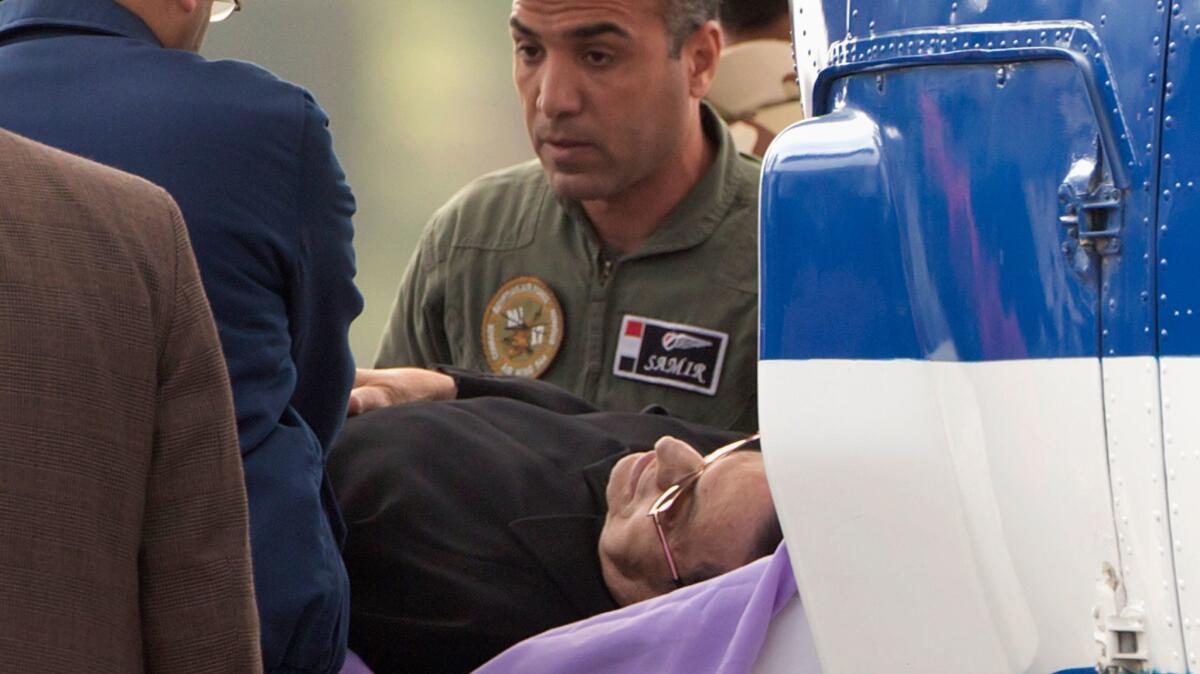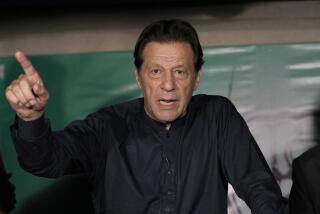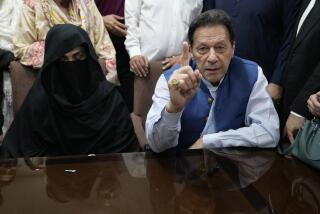Egypt’s Mubarak acquitted in final ruling on 2011 protester deaths

- Share via
Reporting from Cairo — Egypt’s highest criminal court on Thursday acquitted former President Hosni Mubarak of charges of complicity in the deaths of hundreds of demonstrators who fought to unseat him in 2011, a verdict that potentially sets the stage for the onetime strongman to go free.
Mubarak, who at 88 has spent much of the past six years confined to a military hospital, already completed a three-year sentence in a separate embezzlement case.
He was sentenced to life in prison in 2012 for the protesters’ deaths — nearly 900 in total — which took place during street protests that helped ignite uprisings against repressive governments across the Middle East during the so-called Arab Spring.
But an appeals court ordered a retrial that resulted in the charges against Mubarak and some of his top aides being dropped on largely technical grounds.
State prosecutors requested a second retrial culminating in Thursday’s decision by Egypt’s Court of Cassation, which legal experts said leaves no further avenue for appeal or retrial. The judge also rejected a civil petition seeking compensation for families of some of those killed.
“People are desperate at this point,” said Hoda Nasrallah, a lawyer with the Egyptian Initiative for Human Rights which represented some of the victims’ families. “They feel like their relatives’ blood has gone to waste.”
Mubarak was flown by helicopter to a Cairo courtroom for the hearing. Sitting in a wheelchair in the caged defendants’ dock, he occasionally waved and smiled at supporters, including his sons, Gamal and Alaa.
“Can you hear me?” Judge Ahmed Abdel Qawi asked Mubarak, according to an account in state-run Al Akhbar newspaper.
“Yes, I can hear you,” Mubarak said.
The judge then read out the charges and asked Mubarak what he thought.
“This didn’t happen,” Mubarak said.
When the judge announced his decision, supporters of the aging leader erupted in cheers and ululations. “We love you, president!” they shouted, and “long live justice!” Later, some celebrated in the streets, handing out chocolates to policemen and other supporters.
The families of those who died were not in the courtroom Thursday. For them, it was a dispiriting although not unexpected verdict.
Mubarak’s successor and Egypt’s first democratically elected president, Mohamed Morsi, was toppled in a military coup in 2013. He is now behind bars along with thousands of his Muslim Brotherhood supporters and scores of secular activists, some of whom played leading roles in the Arab Spring protests.
A former military man, Abdel Fattah Sisi, is once again at the helm of the Arab world’s most populous nation.
Mai El-Sadany, a legal expert at the Tahrir Institute for Middle East Policy, said Thursday’s ruling was indicative of the seeming disarray in Egypt’s once-respected court system. “It reflects an absolute failure of Egyptian judicial and legal institutions to hold any official accountable for the killing of nearly 900 protesters,” she said.
When the charges against Mubarak were dropped in 2014, scattered protests broke out. But the response was more muted Thursday.
Many Egyptians are have grown weary of years of unrest and are more focused on current troubles, including an Islamist insurgency in the Sinai Peninsula that has killed hundreds of troops and led to the displacement of thousands living near the border with the Gaza Strip.
Mubarak does not face any additional charges, but it was unclear whether he would leave the medical facility that has been his home in recent years.
After the hearing, a helicopter returned him to the hospital in a leafy Cairo suburb.
Special correspondent Medhat reported from Cairo and Times staff writer Zavis from Los Angeles.
Twitter: @alexzavis
ALSO
Iraq’s offensive against Islamic State militants in western Mosul sends thousands on trek for safety
North Korea: Heart attack, not nerve agent, killed Kim Jong Nam
Abuse survivor quits pope’s child-protection panel, citing lack of cooperation in the Vatican
UPDATES:
4 p.m.: This article was updated with staff reporting.
This article was originally published at 8:10 a.m.
More to Read
Sign up for Essential California
The most important California stories and recommendations in your inbox every morning.
You may occasionally receive promotional content from the Los Angeles Times.













